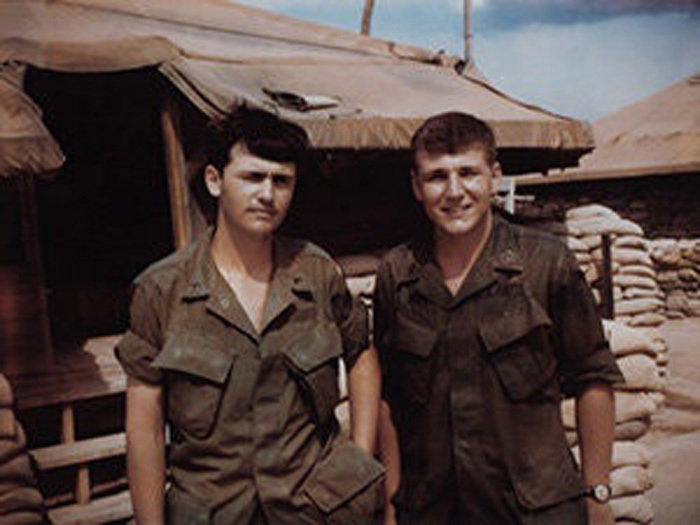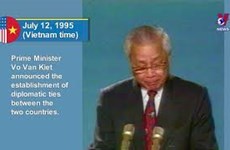Vietnam and the United States have experienced a traumatic past. Do you two have unforgettable feelings and memories during your return to Vietnam with the peace mission?
Chuck Hagel: I think that anyone who joined the war and saw by their own eyes the tragedy, the suffering that the war brought to both sides, will be affected forever.
 |
|
Mr. Chuck Hagel (right) and his younger brother in Vietnam in 1968. Photo: Nytimes |
It affected me and my brother when we served in the battlefield in Vietnam in 1968. Later, when participating in the political system, the Government, when making decisions as a senator and Defense Minister, no big options were made without thinking of my time in Vietnam.
I remember all the men and women who joined me in the war, the places where I worked in the Mekong Delta, Dong Tam, Binh Phuoc, and Saigon. I remember the small villages we used to visit, even though we could not speak Vietnamese and the Vietnamese people there did not speak English, we had an invisible connection with each other. It was the humanity that made the connection between us, especially when we saw the kids.
It's hard to explain, but those memories are always on my mind, and I believe that everyone who was there with me felt the same way. For those who participated in the war, the memory of the tragedy of war, the reality of death, destruction, and suffering certainly remained in them.
My younger brother and I always keep in touch with my friends in Vietnam. We are lucky to still be able to do other useful jobs, after all our experiences in the Vietnam War. I can say that memory follows us throughout the life.
John Kerry: The 2016 Mekong Delta visit was not the first time I returned after leaving the Vietnam battlefield. I was there many times as a senator - the time when I was involved in solving the POW/MIA issue which was a key factor in determining whether the US could move towards normalization its relations with Vietnam or not.
I once met a man on the other side of the line. He knew very well about the ambush battlefield I used to ambush. It is hard to believe that many years later when we met, we talked to each other in this place without a bit of hostility.
We no longer saw each other as enemies. It's a wonderful lesson from the war. The relationship between the US and Japan, between Germany and the US, and elsewhere are also typical examples for the transition from enemy to friend. From my personal experience, I am very proud that I have also put my effort into helping the two countries end the war, reconnect their relationship, and get closer.
In the process of normalizing the Vietnam-US relationship, you all made significant contributions to the US Government. Mr. John Kerry, what motivated you to oppose the war and strongly support the normalization of relations between the two nations?
John Kerry: In my opinion, the American involvement in the war was based entirely on lies, historical misunderstandings and lack of understanding about the country of Vietnam as well as what the Vietnamese people really wanted.
What I learned when I came to Vietnam is that what people told you is not necessarily true of what you actually see.
I saw a completely different Vietnam, a Vietnam that suffered decades of colonial domination, a Vietnam that fought for its independence and national identity. The Americans got themselves into a war which then caused a series of terrible consequences that the American soldiers, the US and the Vietnamese people suffered.
I feel very resentful about what happened and I know that I need to take responsibility to prevent this bad thing from happening again. I lost many good friends in this war, saw many lives taken away. I think many Vietnamese also had irreparable losses when their relatives and friends died in the war. The war deeply divided the two countries. Fortunately it is over.
 |
|
Mr. John Kerry pays a visit to the Mekong Delta. Photo: US State Department |
The time has passed quickly. Unbelievably, it has been 25 years since the two countries normalized relations. When this process started, it was very complicated, arduous and very difficult. It was all left by the war. There were many doubts, suspicions, forcing the two countries to step by step rebuild their trust in each other.
Vietnam's leaders have a wonderful vision of the bilateral relationship. Foreign Minister Nguyen Co Thach is a visionary, like Le Duc Anh and Le Mai, who made great efforts in building and consolidating trust between the two countries.
On our side, President George H. W. Bush and Bill Clinton both contributed with the determination that the two countries would listen to each other's point of view, step by step initiating the normalization process. People like me and John McCain spent almost ten years on this, from the initial efforts of both sides, until the embargo was lifted and then relations were normalized.
The ice breaker in Vietnam-US relations
You have just mentioned our leaders as people who made great contributions to the normalization of relations between the two countries. How about you, what do you think about yourself as an "icebreaker" for the US in this relationship?
Mr. John Kerry: Certainly, normalization of relations took the work and efforts of many people. Without the help of well-intentioned people who worked so hard in this regard, we would never have been able to come to this day. One person's strength is limited, but if we have the cooperation of many people with high confidence, everything can become a reality.
From the beginning there was a lot of suspicion, but gradually we have built up the understanding that we are all honest, as in finding missing soldiers, and not criticizing. We do this because we owe the families of victims an answer.
No matter how great the goodwill is, we cannot ignore it and say let's shake hands with Vietnam when their families have yet to receive satisfactory explanations. So we came up with an initiative that can be said to be the most important, the largest, most profound and thorough in the history of war of humans to find the answer not only for Americans but also for the Vietnamese people.
Mr. Hagel, after the years of war, you have done so many things to bring us closer together. Can you share your views when healing the relationship between the two countries?
Mr. Hagel: I think it is a straightforward re-examination of the problems that the US made in Vietnam over all these years that has helped us to re-evaluate this relationship. About this, I highly value American leaders and veterans when they are truly objective and honest. It's not easy to admit the mistakes we've made.
 |
|
Mr. Chuck Hagel meets Vietnam's Defense Minister Phung Quang Thanh in 2014.
|
After I returned from Vietnam, and after the war ended, I had always believed in and did all I could to bring Vietnam and the United States back together. Focus on our common interests, first of all, we are human beings, and focus on helping each other in commerce, economics, security, diplomacy. I'm glad that I had the opportunity to be involved in some of those matters when I was a US senator and even before that.
As the Defense Secretary, I made a number of trips to Asia and the Pacific. It was one of special trips. I had a meeting with all the ASEAN Defense Ministers in Hawaii, which had never happened before, including the Vietnamese Minister of Defense and his wife.
We had a two-day conference and discussed ways that countries could cooperate more fully, not only in terms of the military and security but in all aspects. Therefore, I have always strongly supported many things that Vietnamese and Americans can do together to make our countries better, and for a better world.
Bui Chi Trung (Senior Lecturer at the Press and Communication Training Institute, National University of Social Sciences and Humanities) - Tran Quang Huy (Social Media Specialist)
To be continued...

Vietnam-US ties move from former foes to comprehensive partners
2020 marks 25 years of Vietnam-US diplomatic relations. Though not really a long time it may seem, the establishment of bilateral diplomatic ties was significance to both countries.

Looking back on 25 years of Vietnam-US relations: The role of US Senators
What Vietnam and the US have done is the result of a long process with persistent efforts by both sides to overcome major obstacles.